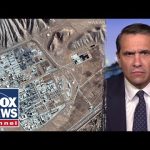In recent discussions surrounding Iran’s nuclear capabilities, a classified briefing for senators has sparked significant concern and speculation about the future of military and diplomatic efforts regarding the nation’s controversial nuclear program. Senator Rand Paul, a member of both the Foreign Relations and Homeland Security Committees, has been at the forefront of this dialogue, particularly in light of military actions that could influence Iran’s nuclear aspirations.
Senator Paul expressed his feelings of unease about the potential for military strikes to inadvertently encourage Iran to accelerate its push towards developing a nuclear bomb. After attending the classified briefing, he highlighted a sense of uncertainty about Iran’s direction, indicating that it is difficult for anyone to predict what choices the Iranian leadership may make moving forward. The senator remains hopeful that the military action taken might serve as a long-term deterrent. However, his optimism is tempered by the historical patterns seen in Iran’s reactions to external pressures, which often result in a unified response against perceived threats.
Paul’s comments reveal a deeper concern that rather than leading to a peaceful resolution, military intervention might push Iran further toward nuclear armament. This fear is underscored by the possibility that the Iranian regime may choose to rally patriots around the flag instead of pursuing diplomatic avenues. The senator articulated a wish for Iran to re-enter the global community by abandoning its nuclear program, which would foster trade and improve the living conditions of its citizens. However, he also acknowledged the doubts surrounding whether such a transformation is aligned with Iran’s historical tendencies.
The urgency of the situation is amplified when considering the reported skyrocketing levels of uranium enrichment in Iran over the past few years. Senator Paul noted leaks from intelligence sources suggesting that recent military strikes may have delayed Iran’s nuclear progress by months. Yet, he cautioned that substantial quantities of highly enriched uranium could still be unaccounted for, leaving the door open for Iran’s potential defiance of international agreements. If Iran chooses to exit existing treaties, such as the one concerning nuclear inspections, it could pose a significant risk to global safety.
In all these discussions, a key factor remains the potential for diplomacy—even amid military conflict. Senator Paul acknowledged that while military action may effectively hinder immediate threats, genuine progress towards nuclear disarmament will ultimately necessitate diplomatic engagement. He highlighted the importance of allowing diplomatic channels to remain open, particularly in the context of a fragile cease-fire between Israel and Iran. If this cease-fire can be maintained, it could pave the way for negotiations aimed at dismantling Iran’s nuclear ambitions.
As the situation unfolds, the hope is that diplomacy will prevail over conflict, leading to a safe and secure environment for both the region and the world at large. It remains to be seen how Iran will respond to the latest developments, but the dialogue surrounding their nuclear ambitions is far from over.




